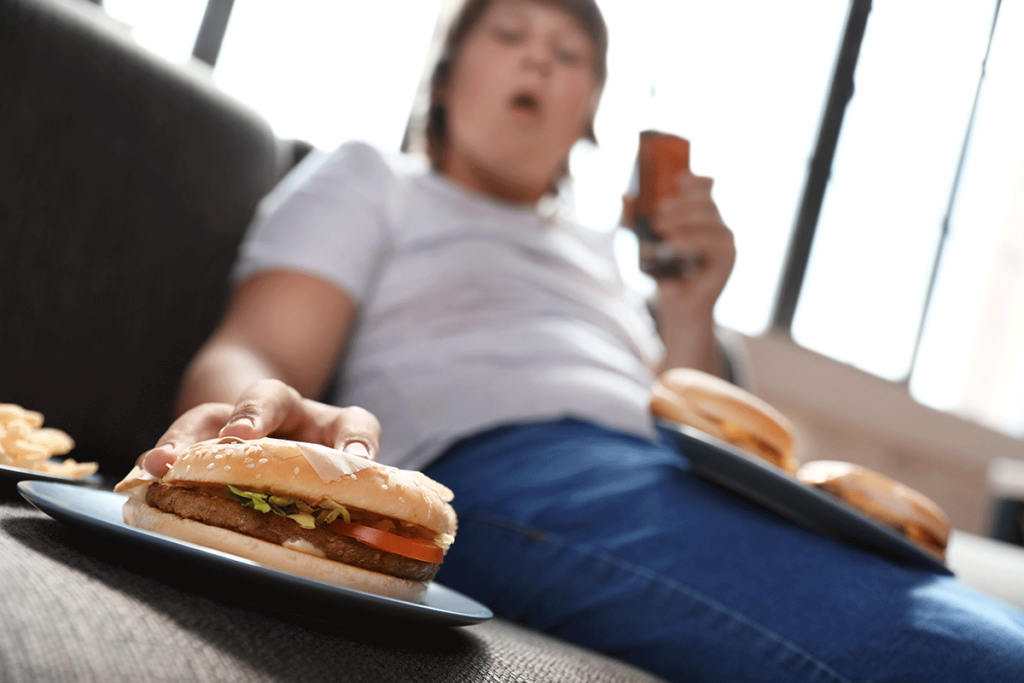Bipolar disorder is a mental health condition characterized by extreme mood swings, ranging from episodes of mania to depression. Binge eating causes a person to consume a large amount of food quickly. While it may not seem like these two issues could be related, recent studies have suggested that bipolar disorder can cause binge eating.
If you or someone you know struggles with bipolar or binge eating disorder, please get in touch with Imagine Seattle today. We can help you take the first step toward improving your mental health and achieving a brighter future. Contact us today at 888.346.0473 to start therapy for binge eating or bipolar disorder treatment.
Symptoms of Binge Eating Disorder
Binge eating disorder is characterized by consuming large quantities of food in a short period of time, typically within two hours. The person feels no control over their eating habits during a binge episode. Some of the symptoms of binge eating disorder include:
- Eating alone because of embarrassment
- Eating when not physically hungry
- Eating large amounts of food in a short time
- Feeling guilty, ashamed, or depressed after eating
Feeling discomfort, such as bloating, after eating a large amount of food is also common with this mental health issue.
Symptoms of Bipolar Disorder
Bipolar disorder can cause changes in energy, mood, and activity levels, leading to eating disorder symptoms. Some of the symptoms of bipolar disorder include:
- Mania – Increased energy, reduced need for sleep, racing thoughts, and grandiosity
- Hypomania – Similar to mania but less severe
- Depression – Sadness, hopelessness, fatigue, loss of interest in activities, and changes in appetite and sleep
Bipolar disorder can be associated with an increased risk of developing binge eating disorder, leading to obesity, heart disease, and diabetes.
Can Bipolar Disorder Cause Binge Eating?
Bipolar disorder and binge eating disorder have many symptoms in common. Individuals with bipolar disorder might use food to self-medicate or manage their symptoms. While more research is needed to explore the connection between bipolar disorder and binge eating disorder, studies have shown that people living with bipolar disorder are more likely to develop eating disorders.
Individuals with bipolar disorder may also be more likely to engage in impulsive and reckless behaviors, including binge eating. Due to the nature of the disorder, people with bipolar disorder may not recognize the severity of their symptoms or may feel unable to control their behaviors. They may turn to food as a source of comfort or indulgence when feeling manic or depressed.
Treatment Options for Bipolar Disorder and Binge Eating
It’s crucial to identify and treat both bipolar and binge eating disorders to provide patients with the best possible outcomes. Treatment options for bipolar disorder may include medication, therapy, and lifestyle changes.
Medication therapy for bipolar disorder may include mood stabilizers or antipsychotic medication to help regulate mood, while psychotherapy can be helpful in helping individuals better manage their symptoms. Lifestyle changes such as regular exercise, good sleep hygiene, and a healthy diet can also help manage the symptoms of bipolar disorder.
As for binge eating disorder, cognitive-behavioral therapy (CBT) is typically the first line of treatment. It’s a form of psychotherapy that effectively addresses the negative thinking patterns that can lead to binge eating. Working with a registered dietitian or nutritionist can help develop healthy eating patterns and habits.
Recover from Bipolar and Binge Eating Disorder at Imagine Seattle
If you or a loved one is struggling with bipolar disorder, binge eating disorder, or both, Imagine Bellevue can help. Our outpatient mental health program provides trauma-informed care, medication management, and an array of psychotherapies such as group therapy, individual therapy, family therapy, CBT, and DBT.
We can work with you to develop a customized treatment plan that addresses both disorders and your unique needs. Our team of experienced mental health professionals can help you get back on track, manage your mental health, and develop a healthier relationship with food.
Contact Imagine Seattle today at 888.346.0473 or online to learn more about our bipolar disorder treatment and binge eating disorder treatment options. Let us help you on your journey towards mental wellness.

